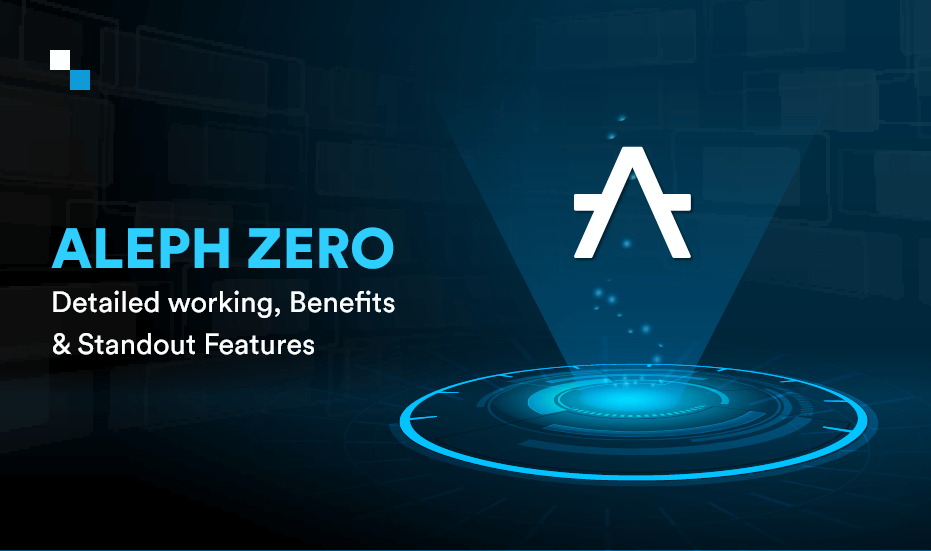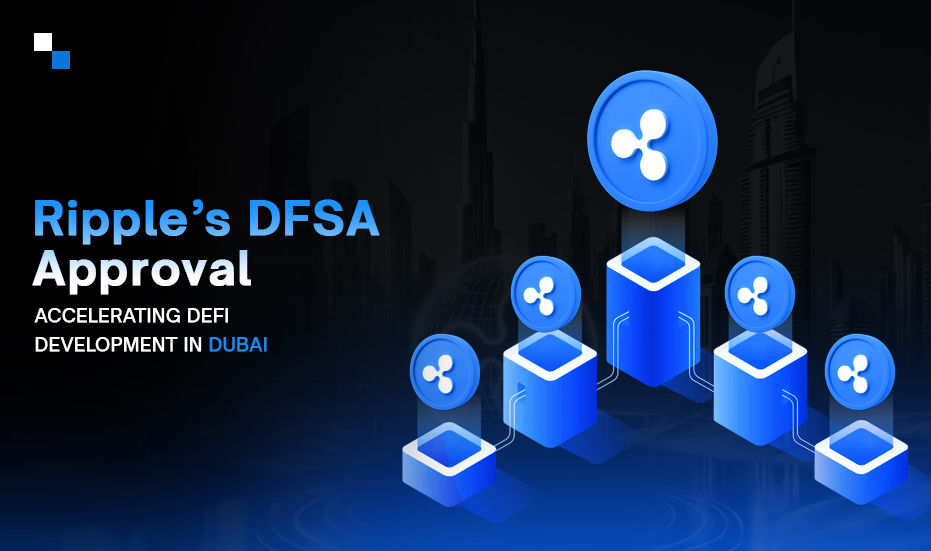
How Do You Create Your Own Buy-Sell Trading Exchange in 2024?
October 19, 2023
How to Get Started with Sustainable NFT Solutions
October 19, 2023Layer 1 public blockchain platforms form the foundation of the blockchain ecosystem, and their significance is growing as the demand for decentralized applications and digital assets continues to rise. With the market witnessing increased adoption of blockchain technology in the present scenario, a Layer 1 blockchain platform like Aleph Zero is an ideal investment option for entrepreneurs looking to address a plethora of challenges in their business.
Aleph Zero
Aleph Zero is a privacy-enhancing public blockchain built upon PoS(proof-of-stake) consensus protocol. It is developed utilizing the Substrate stack, an open-source toolkit provided by Parity Technologies, a leading blockchain infrastructure company.
Aleph Zero aims to address the existing challenges in blockchains, specifically focusing on enhancing speed, validation time, scalability, and security. AZERO serves as the native cryptocurrency of this platform.
A pivotal component of Aleph Zero is its adoption of the “hub and spoke” model. This model enables businesses to establish private instances or spokes that interact with the central decentralized ledger. It empowers businesses to engage with each other in a trustless, cost-effective manner while maintaining their individual private networks.
Aleph Zero incorporates two cutting-edge security technologies, zero-knowledge proofs (ZKPs) and secure multi-party computation (sMPC), to safeguard user data privacy and security. ZK-SNARKs securely pass a secret key between users, while sMPCs protect data using multiple computers, ensuring that stored data remains inaccessible without unanimous consensus.
Aleph Zero’s objective is to enable small and medium-sized businesses and enterprises to communicate at a speed akin to regular internet communication, all while harnessing the advantages of decentralization.
Detailed Working
PoS(Proof-of-stake) consensus mechanism & DAG(Directed Auxillary Graph) are two main components of Aleph Zero. Let’s understand how they work.
-
PoS(Proof-of-Stake) Consensus Mechanism
A rotating committee of validators is responsible for securing the network and validating transactions in the PoS consensus mechanism. Much like other PoS blockchains, Aleph Zero’s validators stake AZERO tokens to earn the opportunity to validate transactions and incorporate them into the blockchain.
Aleph Zero introduces a rotating committee of validators to broaden participation in the validation process. This rotation is enabled through elections, ensuring a dynamic validator group while maintaining a consistent number. Even validators not actively serving on the committee receive rewards for their contributions.
The election system encourages validators to remain actively engaged, improving their chances of being selected in subsequent cycles. On the contrary, dissuasive measures discourage validators from engaging in malicious activities, thereby upholding network security.
Aleph Zero follows a practice of selecting a set committee of validators every 15 minutes, resulting in 96 committees chosen over a 24-hour period. Participants are rewarded for their contributions and can claim their payouts at the conclusion of a full era. These rewards are divided, with 90% distributed to validators and nominators and the remaining 10% allocated to the ecosystem fund and treasury. Currently, Aleph Zero boasts 104 validators and over 8,000 nominators.
-
DAG(Directed Acyclic Graph)
Aleph Zero utilizes DAG as an auxiliary structure to collect transaction information. This structure serves as an intermediary component in achieving consensus and constructing the blockchain. DAGs have found several applications in the blockchain domain. Blockchain networks are adopting DAGs to enhance transaction throughput and reduce transaction costs.
Aleph Zero’s consensus protocol is built on the foundation of asynchronous Byzantine fault tolerance architecture (aBFT). This approach ensures effective communication among nodes, even in the presence of potentially malicious nodes.
Why Businesses Must Invest in Aleph Zero?
Aleph Zero stands out as a pioneering blockchain offering advantages for both individuals and businesses. Here are some primary benefits of investing in Aleph Zero:
- Cost-Efficient Transactions: On average, transactions conducted on the Aleph Zero network will incur an approximate cost of $0.0003.
- Enhanced Decentralization: Aleph Zero aims to become the first decentralized DAG-based platform and achieves this through a rotating committee of validators, further bolstering its decentralization efforts.
- High Transaction Speed: Aleph Zero’s AlephBFT achieved an impressive performance in a laboratory test, processing 89,600 transactions per second with a validation time of 416 milliseconds. While real-world performance under heavy user traffic remains to be determined, these results are promising, positioning Aleph Zero as a compelling choice for enterprises seeking high transaction speeds.
- Enterprise Privacy: Aleph Zero provides a solution for enterprises to maintain transaction and smart contract computations in a private manner while benefiting from the speed and security of a public blockchain.
- Robust Development Team: Aleph Zero boasts a substantial team of approximately 25 developers dedicated to the project. This underscores the network’s capacity to continually innovate and enhance its offerings, thereby attracting a growing user base.
Tips to Purchase AZERO coin: The Native Cryptocurrency of Aleph Zero
AZERO, the native cryptocurrency of the Aleph Zero blockchain, has a total supply of 300 million coins and an annual inflation rate of 30 million coins. The network increases the supply by 2.5 million coins through its reward system, with 10% of this allocation directed to the ecosystem fund. The remaining portion is distributed among validators and nominators. AZERO is available on various cryptocurrency exchanges, including KuCoin, Gate.io, Huobi, MEXC Global, Bitrue, and Uphold. Here are some tips to purchase AZERO conveniently:
- Begin by obtaining an AZERO wallet, which can be created on the project’s official website or through one of the alternatives mentioned.
- Once you have your wallet, register an account with your chosen exchange, ensuring that it supports trading and purchases in your location.
- Complete the identity verification process as required by the exchange.
- Deposit either fiat currency or another cryptocurrency to enable your AZERO purchase.
- Navigate to the buying feature on the exchange platform and specify the quantity of AZERO coins you wish to acquire.
- Finalize the purchase, and await the exchange’s transfer of your digital assets, which should be credited to your AZERO exchange wallet.
- Once the coins are in your possession, proceed to withdraw them by providing the address of your AZERO wallet. This action transfers your coins from the exchange to your personal AZERO wallet, allowing you to stake or HODL them as desired.
Things that Make Aleph Zero Stand Out from Other Blockchain Platforms
- Hybrid Consensus Protocol
Aleph Zero employs a hybrid consensus protocol that combines Proof of Stake (PoS) with Directed Acyclic Graph (DAG) as an intermediary data structure. This unique approach also incorporates the aBFT architecture, collectively known as AlephBFT.
- Smart Contract Capabilities
Aleph Zero supports private smart contracts, employing WebAssembly (WASM) instead of Ethereum Virtual Machine (EVM) and smart contract language “ink!”
- Liminal Privacy Layer
Liminal, a multichain privacy layer, can be integrated across various blockchain networks that connect to Aleph Zero. Liminal harnesses zero-knowledge proofs (ZKPs) technology to enable proof of knowledge without revealing sensitive data. Additionally, it incorporates another privacy solution known as secure multi-party computation (sMPC).
- Cloud Storage Integration
Aleph Zero integrates with a decentralized file storage system backed by the InterPlanetary File System (IPFS).
- Substrate Integration
This blockchain seamlessly integrates with Parity’s Substrate Stack, promoting wider adoption. The team has also successfully completed Parity’s Substrate Builder’s Program.
- Common Decentralized Exchange
Within the Aleph Zero ecosystem, you’ll find Common, a decentralized exchange (DEX) built atop the blockchain.
- Dynamic Fee Adjustment
This feature functions as an organizational tool, particularly during peak network congestion. It automatically adjusts fees based on user activity. Users can also use a tipping mechanism to prioritize transactions during network congestion.
- Oracle Integration
Aleph Zero introduces an Oracle bridge that brings real-world, external data onto the blockchain, expanding the Aleph Zero ecosystem. The project aims to integrate with various Oracle providers, offering developers a broad array of choices for accessing external information.
Get Obligation Free Quote
[widget id=”custom_html-3″]
Conclusion
To conclude, Aleph Zero places a strong emphasis on security, addressing the growing concerns surrounding data breaches and cyber threats. Its robust security measures provide a shield against vulnerabilities, safeguarding critical business information. Investing in Aleph Zero equips businesses with a future-proof infrastructure that aligns with evolving industry demands and regulatory requirements, securing their competitive position in the dynamic business landscape of 2023 and beyond. Entrepreneurs willing to know more about Aleph Zero must get in touch with a reputed Blockchain development company like Antier.



